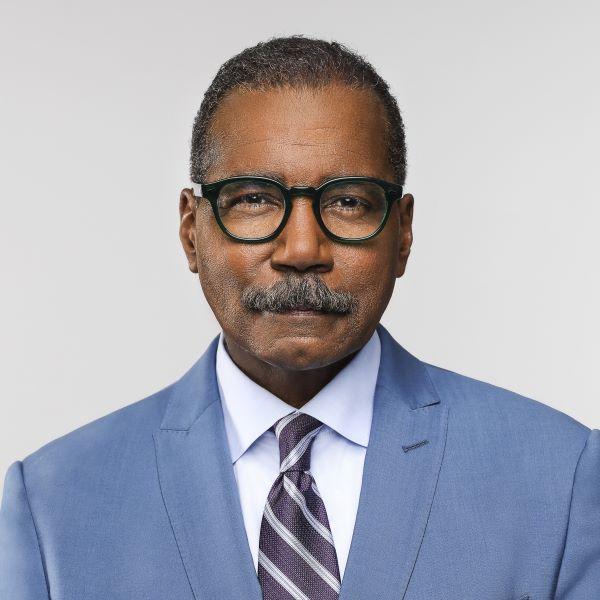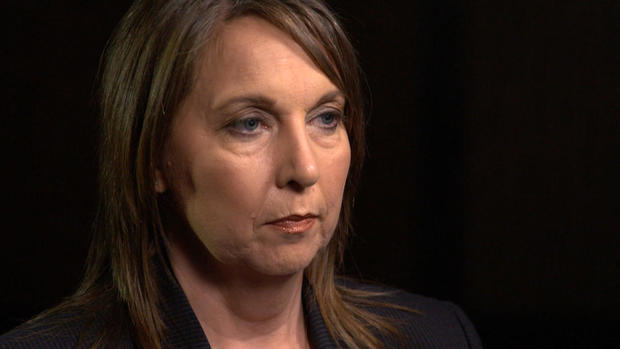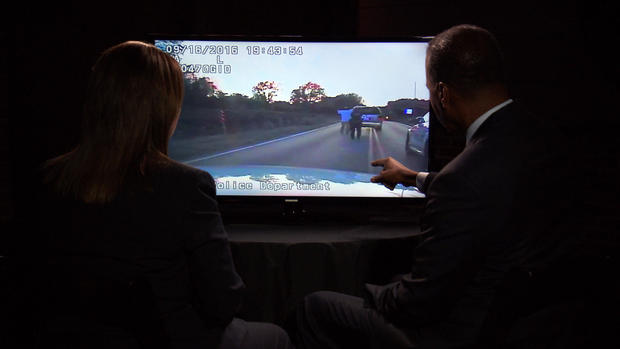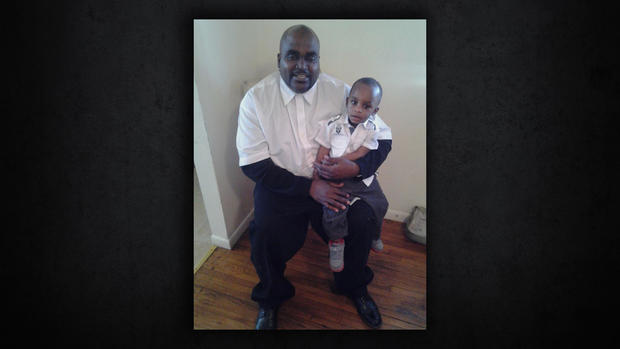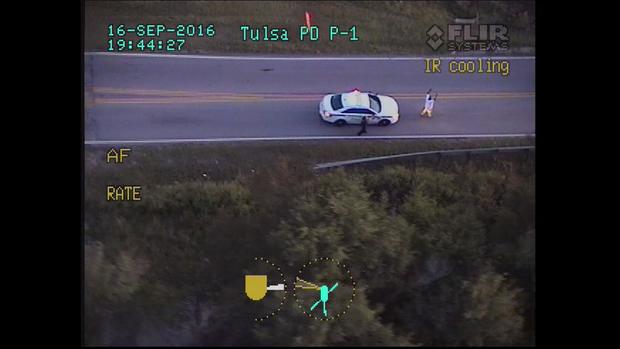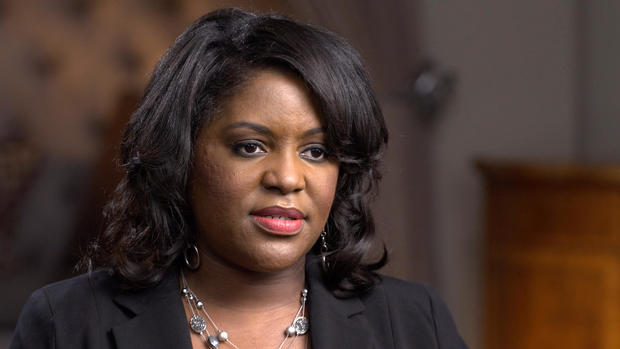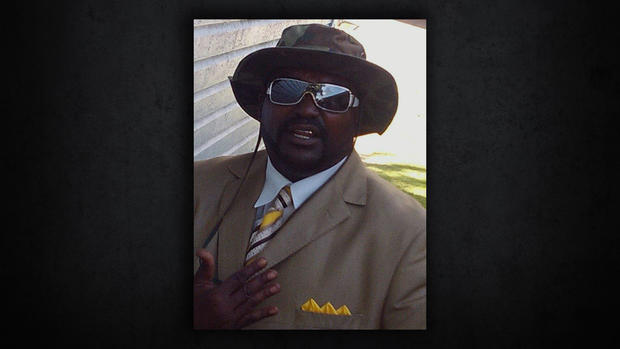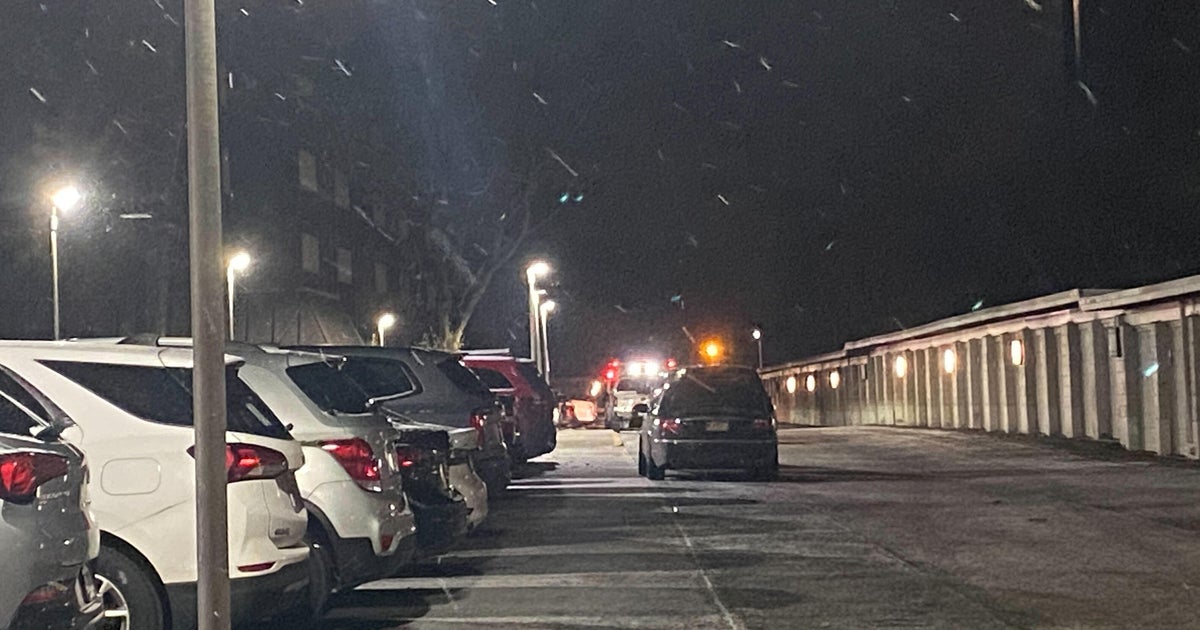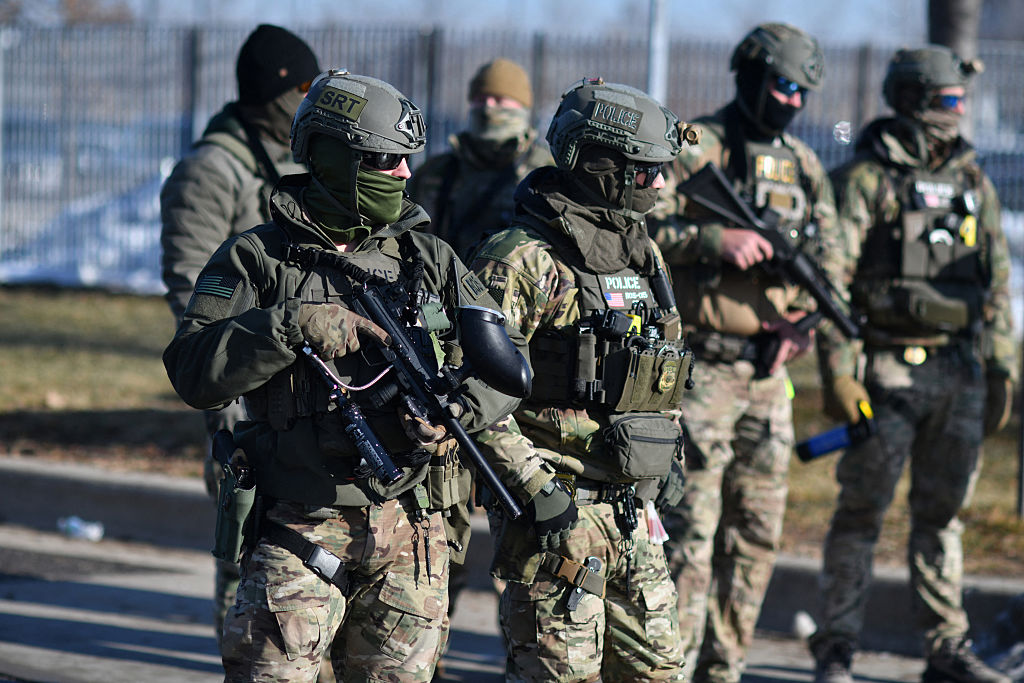Officer Betty Shelby on Terence Crutcher shooting
Update: Betty Shelby has been found not guilty of first-degree manslaughter in the deadly shooting of Terence Crutcher.
The following is a script from "Shots Fired," which aired on April 2, 2017. Bill Whitaker is the correspondent. Marc Lieberman and Michael Kaplan, producers.
Last September in Tulsa, Oklahoma, a brief encounter between a black man, Terence Crutcher, and a white police officer, Betty Shelby, ended with Terence Crutcher's death. He was shot by Officer Shelby who goes on trial in May for manslaughter. She faces four years to life in prison. The shooting was caught on videotape and inflamed the debate about race and policing that's been roiling the nation since Ferguson. It's very likely you have seen video of similar police shootings before. But it's very rare to hear from the officer who pulled the trigger before a jury does.
Tonight, Betty Shelby tells us why she shot and killed an unarmed black man and why she says almost any police officer in her situation would have done the same.
Bill Whitaker: You remember pulling the trigger?
Betty Shelby: I do. It's like slow motion of me bringing my gun up, my finger coming in and then letting off. And he stopped and then he just slowly fell to the ground.
The shooting took place at dusk on this two-lane road in North Tulsa, in a predominantly African-American area. Police cameras captured the climax of the encounter between 42-year-old police officer Betty Shelby and 40-year-old Terence Crutcher. That's Crutcher in the white shirt, walking with his hands up. Shelby, a 10-year veteran of law enforcement, is right behind him with her gun drawn. Just two minutes after they came face-to-face on this road, Shelby fired her gun.
It's hard to see the actual shot on videotape but, from the chopper, you can see Crutcher fall to the ground from the shot to his side.
Betty Shelby: Shots fired!
Police dispatch: Adam 331 we have shots fired, we have one suspect down.
Bill Whitaker: So tell me what I'm not seeing in the video. Up until the time of the shooting, it does appear that he's got his hands in the air?
Betty Shelby: He does have his hands in the air.
But Shelby says the video doesn't tell the whole story. It all started 10 minutes earlier. She was on her way to a domestic-violence call when she says she saw a man she later would learn was Terence Crutcher standing in the road. She noticed his size, about 6 feet, 240 pounds, and his demeanor.
Betty Shelby: His hands are just dropped beside him. His chin is resting on his chest. And he's standing there motionless. And I thought, "Hmmm. I wonder if he's on PCP."
Bill Whitaker: Why did that cross your mind first?
Betty Shelby: Because it was an odd behavior. Zombie-like, I-- I-- it's the best I can-
Bill Whitaker: Zombie-like?
Betty Shelby: Zombie-like.
Bill Whitaker: Did you consider him a threat at that time?
Betty Shelby: No. Not at that time.
So Shelby drove past him and continued on to her call.
About 500 feet beyond where she first saw Crutcher, she came upon an abandoned SUV here in the middle of the road. She didn't activate her dashboard camera because she thought this was just a broken-down vehicle. But when she got out of her patrol car, she noticed the motor of the SUV was running.
Betty Shelby: I work in a high-crime area where every day, we get calls of shots fired. I don't think this is just an abandoned vehicle. So I walk on up to the driver's side. I glance in. I don't see anyone. And I notice the windows are down.
Bill Whitaker: Did you see any weapons?
Betty Shelby: I wasn't looking for any. I was glancing to see if there was someone hurt.
Then she says she noticed the man she had seen just moments before walking toward her and the abandoned vehicle.
Betty Shelby: And I say, "Hey, man, is this your vehicle?" And he mumbles something. And I can't understand him. And he starts putting his hands in his pocket. I say, "Hey, man, take your hands outta your pockets. I'm trying to find out is this your vehicle?" And when I tell him to take his hands out of his pockets, he just immediately puts 'em in the air.
Bill Whitaker: So what's going through your mind?
Betty Shelby: Well, what's goin' through my mind is what I've experienced before. I've encountered people putting their hands in their pockets, and I find a loaded gun in their pocket.
None of the early encounter was recorded on video but Shelby says her training taught her that people on PCP could turn violent and she says Crutcher kept reaching into his pocket.
Betty Shelby: That's when I get on the radio and say I've got a subject that's not showing me his hands. And it was at that point that I drew my weapon in a ready position. It would just be a motion like this if you need to.
Bill Whitaker: Was he being belligerent?
Betty Shelby: No.
Bill Whitaker: Was he showing any aggression?
Betty Shelby: No.
Bill Whitaker: Is it possible that you saw him as more dangerous because he was a large black man?
Betty Shelby: No. What I based everything on was his actions, his behaviors. Race had nothing to do with my decision making.
Shelby says Crutcher kept ignoring her commands, kept walking toward the SUV even though she had drawn her gun, and had ordered him to get on his knees.
Betty Shelby: And he's not doing it. I'm hollering at him, "Stop. Stop now. And he has now put his hands back up in the air. And he's looking at his vehicle, back at me."
Bill Whitaker: And you're thinking?
Betty Shelby: I'm thinking he's calculating how he can get to his vehicle to get whatever weapon it is that he's going to get because he didn't find it in his pocket.
Tyler Turnbough: I was literally a quarter mile away, so I got in the car and drove to the scene quickly.
Officer Tyler Turnbough responded to Officer Shelby's radio call. His siren was on so his dashboard camera was running. The ground-level video of the shooting was recorded from his car.
Bill Whitaker: So what'd you see when you got there?
Tyler Turnbough: The first thing I saw when I got there was Mr. Crutcher walking away with his hands up, Betty has him at gunpoint, and I got out of the car and I can hear her giving him commands. "Stop. Get on the ground. Don't go back to your car."
Natsound: Alright Betty Jo, where you at?
At the same time, a police helicopter swooped in with two officers on board: A pilot and a spotter who, that day, happened to be Officer Betty Shelby's husband.
Natsound: He's got his hands up there for her now.
David Shelby says he could see his wife had a weapon drawn. The pilot saw something else.
Natsound: That looks like a bad dude too.
Bill Whitaker: Did you think he looked like a "bad dude"?
David Shelby: What I-- what I saw was, an individual that was being noncompliant and apparently and obviously refusing to obey the commands of the officer.
"I'm feeling that his intent is to do me harm and I keep thinking, 'Don't do this. Please don't do this. Don't make this happen.'" Officer Betty Shelby
As Officer Turnbough ran to assist, he saw that Betty Shelby had drawn her gun. So he grabbed his Taser.
Tyler Turnbough: If the roles had been reversed and she had her Taser out, then I would've had my gun out.
Bill Whitaker: Did you assess the situation as being dangerous?
Tyler Turnbough: Yes. It made the hair stand up on the back of my neck. I don't know what this guy's doing. Why is he-- why is he walking away from her? What are his intentions? Why doesn't he just stop?
Bill Whitaker: So, we see his arms are up and you're behind him?
Betty Shelby: Yes.
We asked Betty Shelby to look at the video and show us what she saw before the fatal shot.
Betty Shelby: I'm feeling that his intent is to do me harm and I keep thinking, "Don't do this. Please don't do this. Don't make this happen." And then right there he's looking back at me. That's what we call "targeting." So he's getting my position, my last-known location to retrieve and then shoot.
Bill Whitaker: You think he's sizing up the situation to see where you are, how close, if he were to grab a weapon, he would know exactly where to turn to shoot? That's what you're thinking?
Betty Shelby: That-- yes.
It's unclear what happened in the final moments of Crutcher's life. Officers Shelby and Turnbough were in front of the dashboard camera and the helicopter was too far away. But Betty Shelby says, what's hard to see on the video tape, is what she saw. She says Crutcher dropped his arms and reached into the car.
Betty Shelby: His shoulders drop, his arm drops, and he's reaching in. And it's fast. Just that would tell any officer that that man's going for a weapon.
Bill Whitaker: You see this on the video?
Betty Shelby: Yes.
Bill Whitaker: That's what you say is Mr. Crutcher reaching into the car?
Betty Shelby: Yes. I say with a louder, more intense voice, "Stop. Stop! Stop!" and he didn't. And that's when I took aim.
Natsound: Betty Shelby: Shots Fired!
Tiffany Crutcher: I don't know what Officer Shelby was thinking when she pulled that trigger.
Tiffany Crutcher is Terence Crutcher's twin sister. She says the tape shows her brother was not being aggressive, not being threatening.
Bill Whitaker: There is a frame that seems to show that his hands were lowered. And that's what she says alarmed her and made her fear for her life.
Tiffany Crutcher: Of course, she's saying everything that she's supposed to say to defend herself. What we saw on that video is what my dad always taught us to do if we were pulled over by a police officer. Put your hands in the air and put your hands on the car. And my brother did what my father taught us.
Bill Whitaker: Was this a case of "Hands up, don't shoot"?
Tiffany Crutcher: Absolutely. It absolutely was.
But Officer Shelby says it was a case of a noncompliant subject who she perceived was threatening her life. That's why she says she pulled the trigger. Officer Turnbough says he saw the same threat and fired his Taser at the same moment. It was the first time Betty Shelby had discharged her gun in the line of duty.
Bill Whitaker: If things had worked out differently, he would go before a judge, have his day in court.
Betty Shelby: Yes.
Bill Whitaker: But as it turns out, you're judge, jury, and executioner on the spot.
Betty Shelby: No. I saw a threat and I used the force I felt necessary to stop a threat.
Bill Whitaker: Do you think, "I could shoot him in the leg, I could shoot him in the foot"? Is there nothing else you could've done?
Betty Shelby: No. And I'm not trained to shoot someone in the foot. We don't train to be cowboys and to be like what they show on the movies.
Terence Crutcher lay bleeding in the street for about two minutes before officers moved in to check him for weapons and administer first aid. He was pronounced dead at the hospital. A vial of PCP was found in the driver's side-door pocket. But police found no weapons on his body or in his car.
Bill Whitaker: Do you have any regrets about this?
Betty Shelby: I have sorrow that this happened that this man lost his life but he caused the situation to occur. So in the end, he caused his own.
Bill Whitaker: He caused his death?
Betty Shelby: Yes.
Bill Whitaker: Officer Shelby says that your brother's actions caused his own death. What do you say to that?
Tiffany Crutcher: My brother's dead because she didn't pause. And because she didn't pause, my family, we've had to pause. We've had to stop. We've had to lay down every single night with tears in our eyes. There was absolutely no justification whatsoever, with all the backup, for Officer Shelby to pull that trigger. No justification whatsoever.
Betty Shelby: If I wait to find out if he had a gun or not, I could very well be dead. There's something that we always say. "I'd rather be tried by 12 than carried by six."
Bill Whitaker: But as it turned out, he did not have a gun.
Betty Shelby: No, he did not.
Bill Whitaker: And because of your action, a man is dead.
Betty Shelby: Yes.
Bill Whitaker: How do you come to terms with that?
Betty Shelby: It's very difficult.
Bill Whitaker: Still?
Betty Shelby: Yes. I never wanted to be in that spot. His actions dictated my actions.
Bill Whitaker: You can take your time.
Betty Shelby: I never wanted to kill anyone.
Betty Shelby says she acted out of fear for her life. But many in Tulsa's black community say her fears were unfounded and influenced by race. That part of the story when we come back.
"My incident is not a racist incident. I am not racist. Race had no factor in what happened." Officer Betty Shelby
After Tulsa police officer Betty Shelby shot and killed Terence Crutcher on a two-lane road last September, video of the incident ricocheted around the country. It's unsettling and, at the moment the shot is fired, it's unclear. Where some may see a threatening and noncompliant subject, others may see a nonaggressive man shot with his hands up. How 12 jurors see it when the trial begins in May will determine Betty Shelby's fate. Black Tulsans tell us they'll be watching. It's a tale they say they have seen too many times before.
Bill Whitaker: There are people in black communities all across the United States who think that white officers overreact when it comes to dealing with black men in general, and they view this through that lens. What do you say to those folks?
Betty Shelby: My incident is not a racist incident. I am not racist. Race had no factor in what happened.
Ray Owens: Race had everything to do with her pulling the trigger that day.
Ray Owens has been pastor of Metropolitan Baptist Church -- Tulsa's largest predominantly black congregation -- for 11 years. Pastor Owens saw police bias in the video and heard it in the words of the pilot.
Pilot: That looks like a bad dude, too.
Ray Owens: I think the statement represents the same bias against African-American males that caused Betty Shelby to pull the trigger.
Bill Whitaker: What do you mean?
Ray Owens: Betty Shelby very likely viewed Terence Crutcher as a "bad dude." Is she a racist? Does she, you know, have some ill will toward black people? I doubt it. But if she is like so many people in our nation, she assumes too quickly that a black male, especially out on the streets at night, is a threat and not a citizen. Is a suspect and not—a decent human being.
Bill Whitaker: You don't think a white citizen of Tulsa would have been treated the same way?
Ray Owens: I don't think that a young white male would be dead today.
These are the final moments of Terence Crutcher's life. You can see him here, walking. His hands are up. Officer Shelby says she thought he was walking back to his car to retrieve a gun. When he got to the driver's side window, she says he reached in and she fired. It turned out Crutcher did not have a weapon.
"I saw Trayvon Martin. I saw Mike Brown. I saw Philando Castile. You know, I saw Tamir Rice. But never in a thousand years would my family, would we have thought that we would be on their side of it." Tiffany Crutcher
Tiffany Crutcher: Nobody went to check on him. He laid there. They let him lay there like an animal.
Terence Crutcher's twin sister, Tiffany, says her brother's death fits a tragic narrative of police shooting unarmed black men.
Tiffany Crutcher: I saw Trayvon Martin. I saw Mike Brown. I saw Philando Castile. You know, I saw Tamir Rice. But never in a thousand years would my family, would we have thought that we would be on their side of it. And my brother now, according to social media, is another hashtag.
Bill Whitaker: Who was he?
Tiffany Crutcher: He would be deemed in our household the gentle giant. Terence was laid back, calm, cool. Gospel music was his love.
His family says Terence was a devoted father of four young children, but they admit he struggled with drug use. He spent four years in prison for selling five grams of crack cocaine. Officer Shelby didn't know any of this when she encountered him on that road, but she says she did suspect he was on drugs. His autopsy showed he had PCP in his system.
"So [Officer Shelby] wasn't called to the scene because Terence was committing a crime, she just noticed a car in the middle of the road, and the outcome was my brother was murdered. Wow." Tiffany Crutcher
Tiffany Crutcher: Maybe he needed some help. Yes, he needed some help. But he ended up with a fatal gunshot wound to the chest. I've had people tweet and say, "Your brother deserved to die. Your brother, you know, is a thug. Your brother should've complied or he would still be alive." You know, "Why didn't he do what the officer asked him to do?"
Bill Whitaker: What do you say to that question that he should've complied?
Tiffany Crutcher: You know, why did she want him to comply? I'm-- I-- I'm still curious. What crime was he committing? Why were you on the scene?
Bill Whitaker: She noticed a car in the middle of the road.
Tiffany Crutcher: So she wasn't called to the scene because Terence was committing a crime, she just noticed a car in the middle of the road, and the outcome was my brother was murdered. Wow.
Tulsa leaders feared many citizens would have the same reaction. Dewey Bartlett was mayor at the time. He remembers the call he got from Police Chief Chuck Jordan.
Dewey Bartlett: He said that there was a shooting and it could've been one of those situations where they had their hands in the air.
Bill Whitaker: This is the police chief talking to you shortly after getting to the scene?
Dewey Bartlett: Yes. At that point I went, "Oh boy, this is not good."
Bill Whitaker: Were you concerned that this might trigger civil unrest?
Dewey Bartlett: Oh sure, sure. Because we'd seen it before several times, when this type of-- of event happens, when it's captured on video.
Four days after the Crutcher shooting…
Natsound: He's not going to do anything to you guys.
Police in Charlotte shot a black man. That city erupted.
Igniting fears in Tulsa that this same thing could happen. So, the mayor and police chief called Pastor Owens and other religious and community leaders together to show them the video and to help brace the city for the storm they feared was coming.
Bill Whitaker: What was the mood in the room? What was the reaction to the video--
Dewey Bartlett: When it showed the gentleman shot and falling down there was an audible.
Bill Whitaker: A gasp.
Dewey Bartlett: Absolutely. It was. It was very difficult to watch.
Ray Owens: The gasp actually filled the room. We couldn't believe it.
Bill Whitaker: Was your reaction the general reaction of the people in the room?
Ray Owens: Oh, very much so. We were all really angry.
The video added to already tense relations between Tulsa police and the black community.
Natsound: Hands up! Don't shoot!
Ray Owens: There's a strong current of an us or them mentality.
Bill Whitaker: Really?
Ray Owens: I do hear that, especially from young men, African-American men, who will still tell me, "I'm afraid when a police officer-- comes up behind me or drives-- behind me." That's a problem.
A long-standing problem in Tulsa. In 1921, this city saw the worst racial violence in American history. It started when an armed white mob gathered to lynch a black man accused of assaulting a white woman. As many as 300 black Tulsans were killed, and an estimated 10,000 left homeless. Time has not healed all wounds. The mayor told us he thought the best response to the Crutcher shooting was complete transparency. The police chief rushed to release the video to the public. He also released Betty Shelby's name.
Chief Chuck Jordan: I want to assure our community and I want to assure all of you, and people across the nation who are going to be looking at this, we will achieve justice. Period.
And they asked black pastors to appeal for peace.
Rodney Goss: I think I reserve the right to be angry and upset at being a black man in an untimely time as this.
More than 1,000 people of all races came to a vigil at Metropolitan Baptist Church.
Ray Owens: It was our attempt to give people a place to say, "I'm mad. I'm hurting. I'm tired of this. No more." And that was the same sentiment that I think was in the minds and hearts of the people who were breaking glass windows in Charlotte. They were saying, "I'm mad."
In Tulsa, there were no broken windows – no violence at all. Six days after the shooting, District Attorney Steve Kunzweiler filed charges against Betty Shelby. He accused her of overreacting when she shot Terence Crutcher. But the charges were filed before the police investigation of the shooting was complete.
Natsound: I've never been so scared.
The lead detective told us he would have found Shelby's actions justified. Shelby was placed on unpaid leave. When her name was made public, she says she felt as if the whole town had turned on her.
Natsound: And we're telling them to fire Betty! Fire Betty! Fire Betty!
Officer Shelby believes she was sacrificed to keep the peace in Tulsa.
Betty Shelby: My situation was no different than-- I don't know whether I should say this-- than a lynch mob coming after me. And I had those very threats. So much that--
Bill Whitaker: You've been threatened?
Betty Shelby: Yes.
Bill Whitaker: Death threats?
Betty Shelby: Yes. I had to leave my home. I had to grab up my family, and leave, and go to a safe place.
Betty Shelby told us she became a police officer to help people and she wants to get back to the job she loves.
Natsound: You gonna go after some bad guys?
While she awaits trial, she finds comfort playing with her grandson. She faces four years to life for the killing of Terence Crutcher. Betty Shelby's husband, Officer David Shelby, recorded the video from the air.
Natsound: Shots Fired!
However you perceive this video, it's an American tragedy.
"I don't believe [Officer Shelby] woke up that morning and said, 'I'm gonna go and kill Terence Crutcher.' I believe that she choked and she pulled the trigger and she killed him." Tiffany Crutcher
David Shelby: To some extent, I think, well, there were two victims that day. I think Terence Crutcher and Betty Shelby.
Bill Whitaker: And Betty's a victim of what?
David Shelby: The social and political climate in our country right now, it's almost like there is a war on police. And I think that that's what's happened to Betty.
Tiffany Crutcher: We need our men and women in blue. But at the end of the day, they're not warriors. They're supposed to be our guardians.
Bill Whitaker: She believes there was a rush to judgment?
Tiffany Crutcher: The video showed everything. It doesn't have a political affiliation, it's not red, it's not blue. It's not black, it's not white. It is what it is. And what we saw was my brother with his hands up. And he was Tased and shot simultaneously.
"The social and political climate in our country right now, it's almost like there is a war on police. And I think that that's what's happened to Betty." David Shelby, husband
Bill Whitaker: Officer Shelby was charged with manslaughter. Are you satisfied with those charges?
Tiffany Crutcher: I am. I don't believe she woke up that morning and said, "I'm gonna go and kill Terence Crutcher." I believe that she choked and she pulled the trigger and she killed him.
Bill Whitaker: Overreacted?
Tiffany Crutcher: Absolutely.
Bill Whitaker: Was Terence Crutcher's an avoidable death?
Betty Shelby: Yes.
Bill Whitaker: Did this have to play out the way it did?
Betty Shelby: No.
Bill Whitaker: What would've changed things?
Betty Shelby: If he would've complied. If he would have communicated with me, if he would've just done as I asked him to do we would not be here. You and I would never have met and no one would ever know my name.
